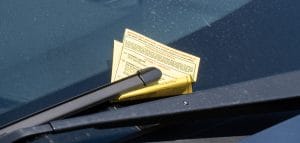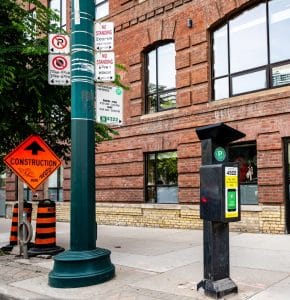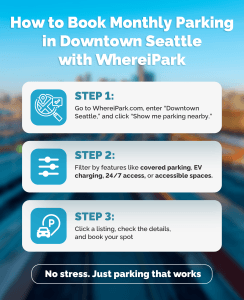Home » Monthly parking » Parking Tickets in Toronto: What to Do When You Get One (And How to Avoid the Next)
 Written by:
Written by: 
Louise is a content producer with over a decade of experience writing about a wide variety of topics from home improvement to academic and scientific reports, and financial literacy and cryptocurrency — but her finance and crypto content are for education purposes only and should not be taken as advice because there are licensed experts for that.Louise is enthusiastic about reinforcing financial literacy and anything that can aid people in minimising expenses and maximising savings, which led to her passion for the sharing economy.She aims to educate people by translating complex information into easy-to-digest facts and practical tips for maximum understanding and minimum migraine. Have any questions about content that you’d like to ask Louise? Drop her an email at Louise@spacer.com.
 Edited by:
Edited by: 
Zarah Mae Torrazo is the Head of Content at Spacer Technologies, where she leads content creation for Parkhound, Spacer.com, Spacer.com.au, and WhereiPark. With nearly a decade of experience in digital content, Zarah specializes in crafting engaging, SEO-optimized writing that bridges both B2B and B2C audiences. Her work spans a wide range of industries from real estate and finance to mobility, health, and tech, with a focus on turning complex ideas into clear, actionable insights. At WhereiPark, Zarah writes extensively about multifamily property management, urban mobility trends, and the monetization of underused assets like parking. She’s particularly passionate about the sharing economy and its power to reshape how people and businesses access space, transport, and opportunity.
Reading time: 10 mins
Got a parking ticket in Toronto? Learn how to deal with it, your options for payment or dispute, and smart tips to avoid future tickets.

Toronto parking tickets are a common frustration for drivers across the city, especially in high-traffic areas like downtown, Queen West, and the Distillery District. Thousands of tickets are issued every day in Toronto and, according to the City of Toronto, about 2.8 million tickets are issued annually. So if you’ve ever found a yellow slip tucked under your windshield wiper in Toronto – whether it’s due to confusing signage, short-term stops in no-parking zones, or simply losing track of time – know that you’re not alone.
While getting a ticket might make you feel like it’s the worst day ever, it doesn’t have to be. In this guide, we’ll break down what to do when you get a parking ticket in Toronto, whether it’s paying, disputing, or dealing with tickets before late fees kick in. We’ll also give you practical tips to help you avoid another ticket in the future, with advice tailored to Toronto’s unique parking rules.
If you ever find a parking ticket on your windshield, take a deep breath and don’t panic. Assess the situation first and determine if your parking ticket is the real thing. The good news is that the City of Toronto gives you several options for dealing with legitimate tickets, but it’s important to act quickly to avoid late penalties or escalated fines. Here’s what to do right away:
You can tell whether the ticket you received is legitimate or a scam with a quick glance. Parking tickets issued by the city of Toronto are yellow and bear the city’s official logo. If your parking ticket is white or off-white and only mimics Toronto’s logo, there’s a high probability that it was either issued by private parking corporations or a scam. As of July 2024, the only private parking company that can legally charge overstays is Imperial Parking (Impark).
Once you determined the legitimacy of the ticket, start by checking the details for key information, such as:
Errors on the ticket (such as incorrect date, location, or license plate) can sometimes help your case if you decide to dispute it.
You have two main options when dealing with a Toronto parking ticket: Pay or Dispute.
Pay Your Parking Violation
If you don’t plan to dispute the charge either because you’re aware of your violation or realized it after the fact, you can pay your ticket using one of the following methods:
Make sure to pay within 15 days to avoid late fees.
Dispute the Ticket
If you believe the ticket was issued in error, or you have a valid explanation, you can request a review through Toronto’s Administrative Penalty System (APS). This is a two-step process:
You must start the dispute process within 15 days of receiving the ticket, so don’t wait.
While you can generally ignore parking violation notices issued by private parking corporations, it’s not advisable to do the same to tickets issued by the city. Ignoring your ticket will only make things harder for you since unpaid tickets can lead to:
If you lose your ticket, you can look it up in the Parking Violation Lookup web app using your license plate and parking violation/ticket number.
Parking signs in Toronto can be confusing for visitors and new residents, which may lead to unknowingly committing a parking violation.
According to historical data from Park in Toronto, the most common parking infractions from 2008 to 2018 were as follows:
A 2021 analysis also identified North York General Hospital and Bluffer’s Park as two of the top locations for parking tickets. These hotspots were further highlighted during a citywide “No Stopping” enforcement blitz from June 16–27, 2025, during which over 3,200 tickets were issued across Downtown Toronto.
Both the historical trends and recent enforcement efforts serve as a reminder that high-traffic areas, hospitals, and popular destinations remain key targets for parking enforcement. To avoid fines, always check for permit requirements, time restrictions, and payment instructions when parking in Toronto.
Even Torontonians get tripped up by the city’s ever-changing signs, restrictions, and enforcement rules. But with a bit of careful planning and some insider knowledge, you can dramatically reduce your chances of getting a parking ticket.

1. Understand Toronto’s Parking Signs
Toronto is notorious for its multi-message parking signs stacked one above the other, so make sure to read and understand each one before parking and leaving your car behind. Pay close attention to:
If you’re unsure or get confused and there’s no one to ask for clarification, it’s best to simply find another off- or on-street parking spot instead of taking an unnecessary risk.
You can also read our Toronto Parking Tips if you want a better grasp of Toronto’s parking scene before you go.
2. Don’t Forget the No-Grace-Period Rule
Some cities give drivers a few minutes’ grace period after paid parking expires, but this isn’t the case in Toronto. Parking enforcement can immediately issue a ticket the moment your metered parking expires, so you won’t have an excuse even if you’re just a minute late. If you must park in metered parking spaces, set a reminder or use an app to alert you before your parking expires.
3. Watch Out for Special Restrictions
Some rules apply only during specific times or seasons, such as:
4. Use Parking Apps and Tools
There are several helpful apps to make parking in Toronto safer and easier:
You may also want to set an alarm on your phone or smartwatch to give yourself time to return.
5. Be Careful in Private Lots
Parking on private property like plazas or condo buildings carries a different set of risks. Tickets issued by private parking companies aren’t city-issued and don’t fall under the same enforcement system, but they can still carry consequences.
While the City of Toronto restricts the authority of private enforcement agencies (PEAs), some are exempt from certain regulations. One such company is Impark, which is exempt from the City Council enacted Bylaw 725-2004 that prohibits private parking operators from issuing their own parking tickets. This exemption exists because Impark clearly posts its parking regulations and, by choosing to park there, drivers are considered to have knowingly entered into a binding contract.
To avoid issues, always check posted signs for terms, make sure you follow payment instructions, and keep your printed or digital receipt visible on your dashboard if required.
Getting a Toronto parking ticket is never fun, but it’s also not the end of the world. The City of Toronto offers clear ways to address parking tickets, but you must act quickly regardless of whether you choose to pay or dispute it. Remember that you only have 15 days to pay or dispute the issued ticket before additional fines are charged.
More importantly, avoiding future tickets comes down to being informed. Take time to fully read parking signs, understand seasonal and time-based rules, and make use of parking apps that help you park smarter. A little planning goes a long way when navigating Toronto’s busy streets.
If you need reliable and affordable monthly parking in Toronto – whether at Distillery District, Harbourfront, Dundas West, or Downtown Toronto— book your parking spot in advance with WhereiPark. Simply type where and when you need parking, and the platform will provide a list of available parking spaces from registered hosts.
WhereiPark is safe and easy to navigate and, best of all, it’s covered by a 100% money-back guarantee. No stress. Just parking that works.

Louise is a content producer with over a decade of experience writing about a wide variety of topics from home improvement to academic and scientific reports, and financial literacy and cryptocurrency — but her finance and crypto content are for education purposes only and should not be taken as advice because there are licensed experts for that.Louise is enthusiastic about reinforcing financial literacy and anything that can aid people in minimising expenses and maximising savings, which led to her passion for the sharing economy.She aims to educate people by translating complex information into easy-to-digest facts and practical tips for maximum understanding and minimum migraine. Have any questions about content that you’d like to ask Louise? Drop her an email at Louise@spacer.com.

Louise is a content producer with over a decade of experience writing about a wide variety of topics from home improvement to academic and scientific reports, and financial literacy and cryptocurrency — but her finance and crypto content are for education purposes only and should not be taken as advice because there are licensed experts for that.
Louise is enthusiastic about reinforcing financial literacy and anything that can aid people in minimising expenses and maximising savings, which led to her passion for the sharing economy.
She aims to educate people by translating complex information into easy-to-digest facts and practical tips for maximum understanding and minimum migraine.
Have any questions about content that you’d like to ask Louise? Drop her an email at Louise@spacer.com.
Demo Description
This will close in 0 seconds
This will close in 0 seconds